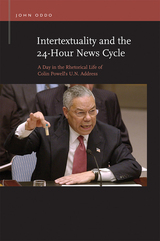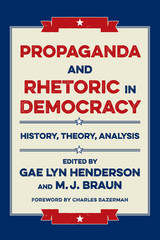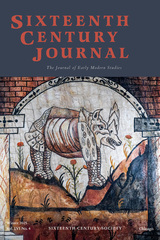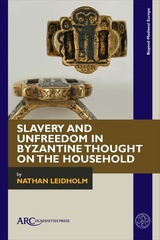2 books about Oddo, John

Intertextuality and the 24-Hour News Cycle
A Day in the Rhetorical Life of Colin Powell's U.N. Address
John Oddo
Michigan State University Press, 2014
On a cold Wednesday morning in February 2003 Colin Powell argued before the United Nations Security Council that Iraq harbored weapons of mass destruction. Before the speech, nearly 90 percent of Americans reported that Powell’s speech would help them determine their view about invading Iraq. In the days after the speech, a strong majority of Americans reported that they found Powell’s evidence convincing enough to justify war. But most American adults did not watch Powell’s speech. Instead, they learned about it from journalists—and to a large extent formed their opinions about war with Iraq based on news coverage of his address. In Intertextuality and the 24-Hour News Cycle John Oddo investigates the “rhetorical life” of Colin Powell’s address as it was extended across several media reports. Focusing on one day of pre- and postspeech news coverage, Oddo examines how journalists influenced Powell’s presentation— precontextualizing and recontextualizing his speech, and prepositioning and repositioning audiences to respond to it. The book surveys a variety of news media (television, newspaper, and Internet) and systematically integrates several methodological approaches (critical, rhetorical, discourse-analytic, and multimodal). This revealing text shows the decisive role that journalists played in shaping American attitudes about Powell, his presentation, and the desirability of war in Iraq.
[more]

Propaganda and Rhetoric in Democracy
History, Theory, Analysis
Edited by Gae Lyn Henderson and M. J. Braun Foreword by Charles Bazerman
Southern Illinois University Press, 2016
The study of propaganda’s uses in modern democracy highlights important theoretical questions about normative rhetorical practices. Is rhetoric ethically neutral? Is propaganda? How can facticity, accuracy, and truth be determined? Do any circumstances justify misrepresentation? Edited by Gae Lyn Henderson and M. J. Braun, Propaganda and Rhetoric in Democracy: History, Theory, Analysis advances our understanding of propaganda and rhetoric. Essays focus on historical figures—Edward Bernays, Jane Addams, Kenneth Burke, and Elizabeth Bowen—examining the development of the theory of propaganda during the rise of industrialism and the later changes of a mass-mediated society. Modeling a variety of approaches, case studies in the book consider contemporary propaganda and analyze the means and methods of propaganda production and distribution, including broadcast news, rumor production and globalized multimedia, political party manifestos, and university public relations.
Propaganda and Rhetoric in Democracy offers new perspectives on the history of propaganda, explores how it has evolved during the twentieth and twenty-first centuries, and advances a much more nuanced understanding of what it means to call discourse propaganda.
Propaganda and Rhetoric in Democracy offers new perspectives on the history of propaganda, explores how it has evolved during the twentieth and twenty-first centuries, and advances a much more nuanced understanding of what it means to call discourse propaganda.
[more]
READERS
Browse our collection.
PUBLISHERS
See BiblioVault's publisher services.
STUDENT SERVICES
Files for college accessibility offices.
UChicago Accessibility Resources
home | accessibility | search | about | contact us
BiblioVault ® 2001 - 2025
The University of Chicago Press









